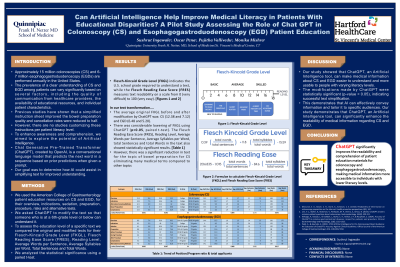Sunday Poster Session
Category: General Endoscopy
P0683 - Can Artificial Intelligence Help Improve Medical Literacy in Patients With Educational Disparities? A Pilot Study Assessing the Role of Chat GPT in Colonoscopy (CS) and Esophagogastroduodenoscopy (EGD) Patient Education
Sunday, October 27, 2024
3:30 PM - 7:00 PM ET
Location: Exhibit Hall E

Has Audio

Sushrut Ingawale, MD, MBBS
Quinnipiac University Frank H. Netter MD School of Medicine / St. Vincent's Medical Center
Bridgeport, CT
Presenting Author(s)
Sushrut Ingawale, MD, MBBS, Oscar Pena, MD, Pujitha Vallivedu Chennakesavulu, MD, MBBS, Monika Mishra, MD, MBBS
Quinnipiac University Frank H. Netter MD School of Medicine / St. Vincent's Medical Center, Bridgeport, CT
Introduction: Around 15 million colonoscopies (CS) and 6-7 million esophagogastroduodenoscopy (EGDs) are performed annually in the United States. The prevalence of a clear understanding of CS and EGD among patients can vary significantly based on several factors, including communication, educational resources, and individual patient characteristics like level of education. Educational disparities exist, with 37% population having no more than a high school diploma and only 14% having advanced education. Previous studies showed that simplified instructions improved bowel preparation quality, and cancellation rates were reduced to half. However, there are no studies customizing these instructions per patient literacy level. With an aim to enhance awareness and comprehension, we aimed to explore the potential role of Chat Generative Pre-Trained Transformer (ChatGPT) to determine how it could assist in simplifying text for improved understanding.
Methods: We used the American College of Gastroenterology patient education resources on CS and EGD, for their overview, indications, sedation, preparation, procedure, risks and alternative tests. We asked ChatGPT to modify the text so that someone who is at a 6th-grade level or below can understand it. To assess the education level of a specific text we compared the original and modified texts for their Flesch-Kincaid Grade Level (FKGL), Flesch Reading Ease Score (FRES), Reading Level, Average Words per Sentence, and Average Syllables per Word. We analyzed the statistical significance using a paired t-test.
Results: The average original FKGL before and after modification by ChatGPT was: CS (12.38 and 7.12) and EGD (6.48 and 5.20). Using ChatGPT there was a significant change in FKGL, FRESe Score (FRES), Reading Level, Average Syllables per Word, and Total Words [Table]. Noticeably, there was a significant reduction in text for the topic of bowel preparation for CS eliminating many medical terms compared to other topics.
Discussion: Our study showed that ChatGPT can make medical information about CS and EGD easier to understand and more usable to people with varying literacy levels. The modifications made by ChatGPT were statistically significant (p-value < 0.05), indicating successful text simplification. This demonstrates that AI can effectively convey information and tailor it to specific audiences. This pilot study would drive further research to address patient education despite the educational, gender, racial, ethnic, socioeconomic and regional disparities.
Note: The table for this abstract can be viewed in the ePoster Gallery section of the ACG 2024 ePoster Site or in The American Journal of Gastroenterology's abstract supplement issue, both of which will be available starting October 27, 2024.
Disclosures:
Sushrut Ingawale, MD, MBBS, Oscar Pena, MD, Pujitha Vallivedu Chennakesavulu, MD, MBBS, Monika Mishra, MD, MBBS. P0683 - Can Artificial Intelligence Help Improve Medical Literacy in Patients With Educational Disparities? A Pilot Study Assessing the Role of Chat GPT in Colonoscopy (CS) and Esophagogastroduodenoscopy (EGD) Patient Education, ACG 2024 Annual Scientific Meeting Abstracts. Philadelphia, PA: American College of Gastroenterology.
Quinnipiac University Frank H. Netter MD School of Medicine / St. Vincent's Medical Center, Bridgeport, CT
Introduction: Around 15 million colonoscopies (CS) and 6-7 million esophagogastroduodenoscopy (EGDs) are performed annually in the United States. The prevalence of a clear understanding of CS and EGD among patients can vary significantly based on several factors, including communication, educational resources, and individual patient characteristics like level of education. Educational disparities exist, with 37% population having no more than a high school diploma and only 14% having advanced education. Previous studies showed that simplified instructions improved bowel preparation quality, and cancellation rates were reduced to half. However, there are no studies customizing these instructions per patient literacy level. With an aim to enhance awareness and comprehension, we aimed to explore the potential role of Chat Generative Pre-Trained Transformer (ChatGPT) to determine how it could assist in simplifying text for improved understanding.
Methods: We used the American College of Gastroenterology patient education resources on CS and EGD, for their overview, indications, sedation, preparation, procedure, risks and alternative tests. We asked ChatGPT to modify the text so that someone who is at a 6th-grade level or below can understand it. To assess the education level of a specific text we compared the original and modified texts for their Flesch-Kincaid Grade Level (FKGL), Flesch Reading Ease Score (FRES), Reading Level, Average Words per Sentence, and Average Syllables per Word. We analyzed the statistical significance using a paired t-test.
Results: The average original FKGL before and after modification by ChatGPT was: CS (12.38 and 7.12) and EGD (6.48 and 5.20). Using ChatGPT there was a significant change in FKGL, FRESe Score (FRES), Reading Level, Average Syllables per Word, and Total Words [Table]. Noticeably, there was a significant reduction in text for the topic of bowel preparation for CS eliminating many medical terms compared to other topics.
Discussion: Our study showed that ChatGPT can make medical information about CS and EGD easier to understand and more usable to people with varying literacy levels. The modifications made by ChatGPT were statistically significant (p-value < 0.05), indicating successful text simplification. This demonstrates that AI can effectively convey information and tailor it to specific audiences. This pilot study would drive further research to address patient education despite the educational, gender, racial, ethnic, socioeconomic and regional disparities.
Note: The table for this abstract can be viewed in the ePoster Gallery section of the ACG 2024 ePoster Site or in The American Journal of Gastroenterology's abstract supplement issue, both of which will be available starting October 27, 2024.
Disclosures:
Sushrut Ingawale indicated no relevant financial relationships.
Oscar Pena indicated no relevant financial relationships.
Pujitha Vallivedu Chennakesavulu indicated no relevant financial relationships.
Monika Mishra indicated no relevant financial relationships.
Sushrut Ingawale, MD, MBBS, Oscar Pena, MD, Pujitha Vallivedu Chennakesavulu, MD, MBBS, Monika Mishra, MD, MBBS. P0683 - Can Artificial Intelligence Help Improve Medical Literacy in Patients With Educational Disparities? A Pilot Study Assessing the Role of Chat GPT in Colonoscopy (CS) and Esophagogastroduodenoscopy (EGD) Patient Education, ACG 2024 Annual Scientific Meeting Abstracts. Philadelphia, PA: American College of Gastroenterology.
